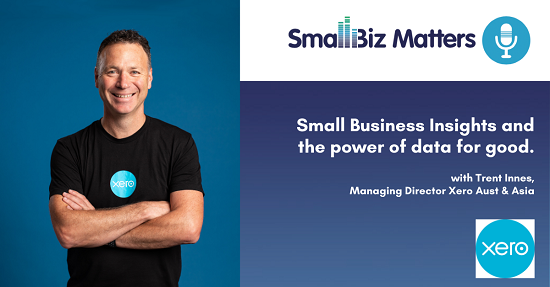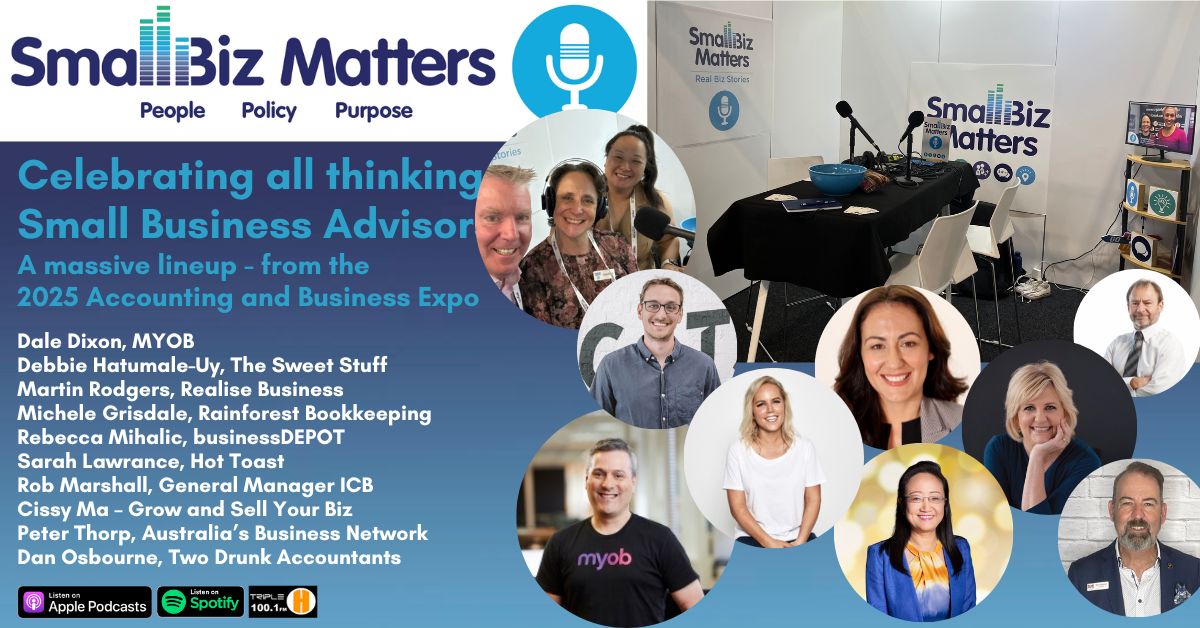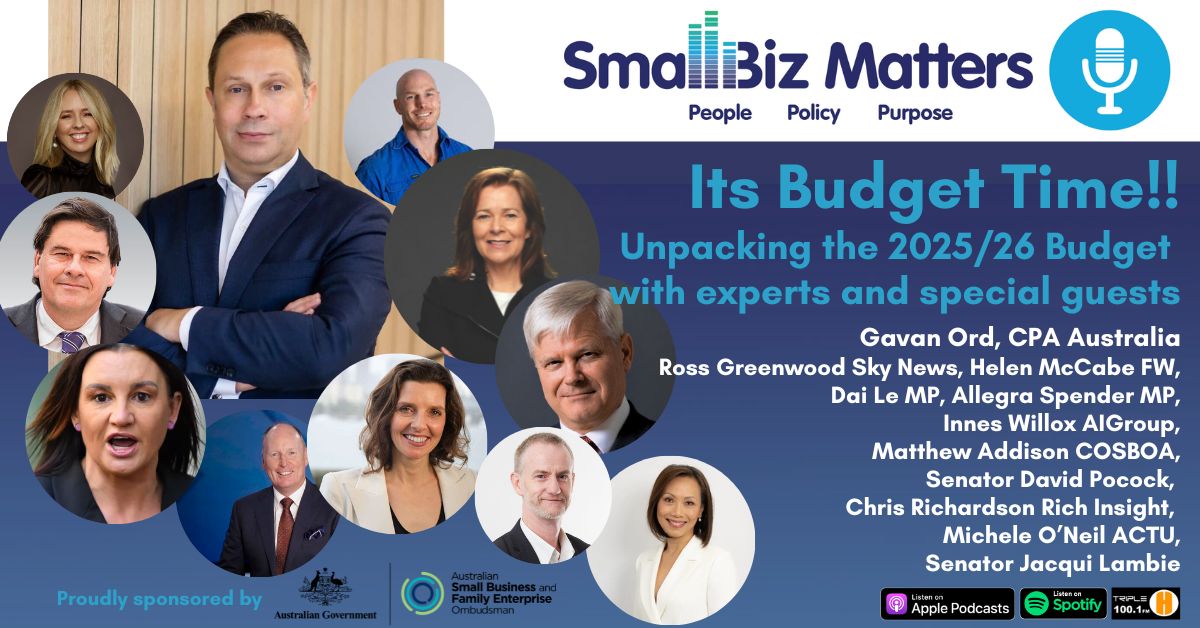Small Business Insights and the power of data for good. With special guest Trent Innes, Managing Director Xero Aust & Asia
| Thursday November 19Small Biz Matters – #187 Providing the small business community with educational content and advocacy since 2014
with Alexi Boyd, broadcaster, advocate and small business owner.
Date: 19 November 2020
In the world of small business data is everything. It helps us to control cash flow, maintain client relationships, streamline basic and complex processes and give us the confidence to know the decisions we make are based on real, up to date information.
And the explosion of cloud based accounting software is what has given small business a power of on-demand financial data to be used in ways we could not have dreamed of only a few years ago. In fact, in times of crisis it’s been a saving grace - the one true source of truth.
But what other ways, beyond how YOU process data, does it have the power to drive change?
I’m delighted to be joined today by Trent Innes, Managing Director of Xero Australia & Asia to talk to Small Biz Matters about the power of data not only to drive the direction of your business but how it guides Govt policy and influences key decision makers all the way to the top.
Topics we’ll be covering:
- Can you tell us about the Xero Small Business Insights program and the reasons for establishing it? To whom do you deliver the info and how does this powerful data guide policy?
- What trends have you been observing in small business in recent months?
- What do you believe to be the role of software companies when it comes to the power in this data and an advocate role?
New September data indicates positive signs of revenue and jobs growth in Australian small business
​Xero​, ​the global small business platform, has today released new data on the health of Australia’s small business sector in September from its Xero Small Business Insights (XSBI) program, in partnership with research firm AlphaBeta (part of Accenture).
Based on anonymised and aggregated data of hundreds of thousands of customer records, the latest XSBI analysis shows the small business sector experienced its fastest revenue growth in six months and a jobs increase after a two-month pause.
Revenue growth fastest in six months
Small business revenue grew 5.2% year-on-year, the fastest pace since March 2020. This is just above pre-crisis average annual revenue growth of 4.6% (July 2019 to February 2020).
Victoria, where lockdowns continued in September, recorded a 0.4% year-on-year revenue rise for the month, which was a significant turnaround from the 6% year-on-year decline recorded in August. Victorian health care (+10%), manufacturers (+8%), professional services (+9%) and retail trade (+8%) underpinned this year-on-year revenue growth result.
Despite the rise in revenue in Victoria, the state is still lagging the rest of Australia with revenue growth almost five percentage points lower than the nationwide outcome.
Jobs growth after two months pause
After largely flat results in July and August, small business jobs rose 0.8% in September and have now recovered around two-thirds of the losses experienced when the crisis hit.
As with revenue, the national result was helped by Victoria, where jobs rose 0.9% in September after falling 3.6% between end June and end August.
Despite the rise in small business jobs in September, the Victorian labour market situation is by far the most challenging across Australia. Victorian jobs are still 10.9% lower than they were prior to the pandemic.
The most positive news around jobs in September was the rise in the two hardest hit sectors so far, with hospitality (+3.2%) and arts and recreation (+2.5%) both recording a growth month-to-month. Although both sectors are still well below pre-crisis jobs levels, at -12% and -15% respectively.
“It is encouraging to see national revenue figures returning to pre-COVID levels and industries that were hit the hardest – hospitality and arts and recreation – experiencing a growth in jobs. ​While small business has been showing a promising recovery, there is still a lot of support needed by the sector to continue this upward trajectory and ensure it can sustain any further turbulence. The September data also provides optimism of a steady rebound in Victoria as restrictions continue to ease,​” said Trent Innes, Managing Director Australia and Asia, Xero.
Casual jobs led the downturn but are now leading the rebuild
XSBI data shows that casual employees were hit hard by the onset of the pandemic, when small business casual jobs fell 25% in late March and early April. From June, casual workers began to be rehired and employment of casuals has risen by 24% since the trough of late April.
There is however still some way to go to return to pre-pandemic small business casual employment levels which remain 5.7% below pre-crisis levels. This is a bigger shortfall than the overall job situation, which has small business jobs 3.9% lower than pre-crisis levels.
Payment times remain faster than pre-crisis level
In April and May average payment times rose slightly with small businesses waiting on average a day longer in April to be paid than the 25.4 days they waited in February. However, this trend reversed in June and by September, small businesses reported that average payment times were 24.1 days or 1.3 days faster than before the pandemic crisis.
"Continued improvement in payment times to small businesses will be pivotal at this time. This can ease the strain the pandemic is placing on cash flow and boost confidence for businesses to rehire. This month is a critical one for small businesses and their employees with various government support measures either coming to an end or getting adjusted. The XSBI October data will provide early indications of how small businesses are adjusting to the new policy settings,” added Innes.
To find out more go to their website: www.xero.com/small-business-insights/
About Xero Small Business Insights
The Xero Small Business Insights (XSBI) program provides analysis on the sector’s health, with its metrics based on anonymised, aggregated data drawn from hundreds of thousands of subscribers. The result is a picture of business conditions that’s more accurate than most private surveys, which typically have a far smaller sample size, and more frequently updated than much of the data on small business. Xero is currently producing a series of specialised monthly metrics, providing a view of the impact of COVID-19.
About our Guest:
Trent Innes is the Managing Director of Xero in Australia and Asia, the global small business platform. Guided by a strong people focus, he has developed and grown Xero's teams around a common purpose: to help small businesses to thrive. Passionate about the power of using data to help policymakers make informed decisions, Trent launched Xero Small Business Insights in 2017, the first true snapshot of the sector’s health. Since launch, the insights have helped to shape thinking on the Australian small business economy. Trent is also passionate about fostering a thriving technology industry in Australia, and using collaboration to bring this to life. In 2017, Trent was named Managing Director of the Year by CEO Magazine.





